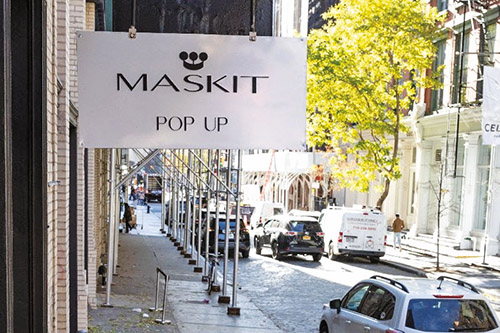

From her Manhattan apartment, Fern Penn is a part of the evolving fashion scene from Brooklyn to Madison Avenue to Tel Aviv. Her Rosebud store brought beautifully designed Israeli fashion to SoHo and then Madison Avenue from 2003 to 2018. Before COVID, she took small groups of women shopping for clothes in Crown Heights boutiques catering to frum women. She conducts fashion tours to Israel, and has one in the works for June 2022. I caught up with Penn for her observations on fashion as 2021 gives way to 2022.
The biggest trend in fashion at year end has been a move to fewer but higher quality outfits. When people were stuck at home during the lockdown, closet cleaning was a major activity. Clothes that weren’t being worn—or didn’t ‘spark joy’ as Marie Condo would say—were given away or tossed out. What to do with all that room? Purchase new clothes differently.
“Things are opening up, people are going about their business, but they’re not interested in buying a lot that is cheap,” said Penn. “They want quality and are willing to spend a little more, assuming they have jobs and can afford it. Stores like Bergdorf Goodman, and the boutiques lining Madison Avenue, are busy.” The movement towards owning fewer but higher quality pieces comes in part from an environmental concern. Fast fashion that gets used up in one season contributes to more in landfills. Who really needs hundreds of garments taking up room in their closets?
Penn is excited about the opening of the iconic Israeli design house Maskit, at 74 Wooster Street in SoHo on December 9 as a two-month pop-up shop. Sharon Tal, head designer, will be in the store all week to meet with customers. Maskit is a high-end luxury brand with stores in Jaffa and Tel Aviv. Started in 1954 by Ruth Dayan, wife of Moshe Dayan, to employ talented immigrants with exquisite embroidery skills, Maskit closed and then was brought back to life eight years ago by Nir and Sharon Tal. They have been coming to New York twice a year to do trunk shows, the last one in February 2020 just before the COVID-19 lockdown. At Penn’s urging, they had a trunk show in a New York showroom last month, which was very successful. “I told them to come back, that people were ready to buy beautifully made clothes again,” she said. At about the same time, the Tals arranged a Maskit presence in SoHo during December and January.
Penn said no one style is dominant now. “It used to be that there was one trend, like cowboy clothes, that everyone had to have,” she observed. Now, people figure out what works for them, and find the brands they like. “Some do maximum glitz and ruffles and others do minimalism.” The minimalist look is personified by names like The Row, Mary-Kate and Ashley Olson’s brand. Gucci is a “mish mash of everything.”
While the looks may vary, they are decidedly put together. Women are dressing up again, in suits, dresses and elaborate coats. Dressing the same outfit up or down adds value to the purchase. Wear a dress to shul with boots and wear it another time with high heels to a simcha.
Black still rules in Manhattan, with an accessory for a pop of color. Penn doesn’t see winter white much in the city—it gets too dirty. But she said the Christian Dior window display is currently showing all winter white. You see white a lot in current fashion photos—no dirt in studios.
Penn isn’t running any Brooklyn shopping tours until the pandemic is over but her contacts say people are shopping again. The owner of Top Fashion in Brooklyn alerted her to a trip made by modest fashion designer Batsheva Hay for an article in this month’s Vogue.
Penn is gearing up for her fashion tour in Israel for June 2022 with high hope that by then COVID-19 will again be in check ( www.rosebudfashiontour.com ). She is working with tour company Via Sabra, known for its unique, interesting food and sightseeing tours, to offer a package that includes hotel accommodations in Tel Aviv with visits to design houses like Maskit, Anny Jacobson, Kedem Sasson, Ronen Chen and Alembika.
Penn finds fashion in Israel exciting and innovative. She mentioned a new venture by two graduates of the Israeli fashion school Shenkar, who have created Fabhouse, a WeWork-type hourly or monthly rental space for fashion designers with a fully equipped pattern department and sewing machines. “People are working together. It’s a fabulous concept that doesn’t exist here,” she said. “When it comes to innovation, Israelis do it so much better.”










